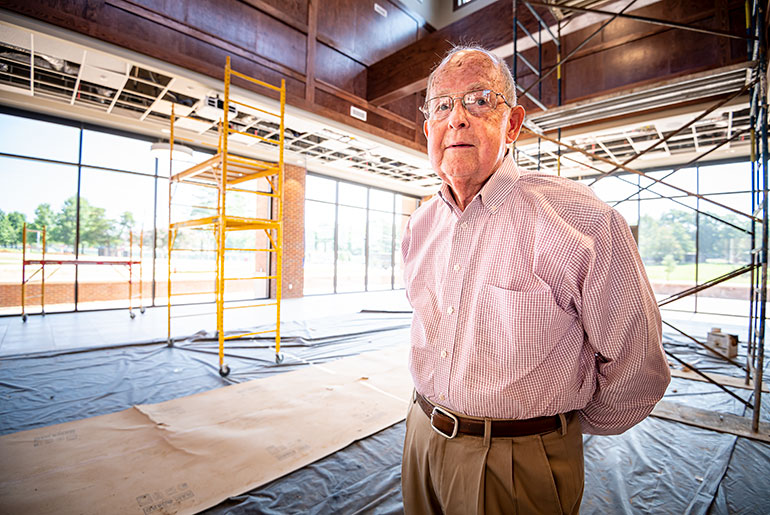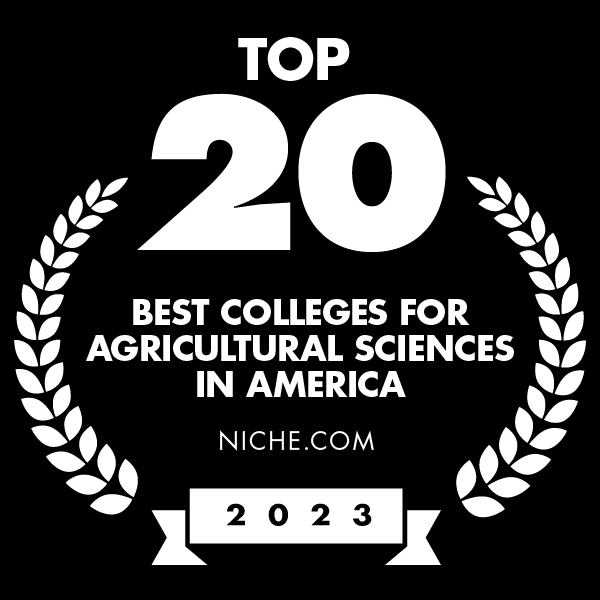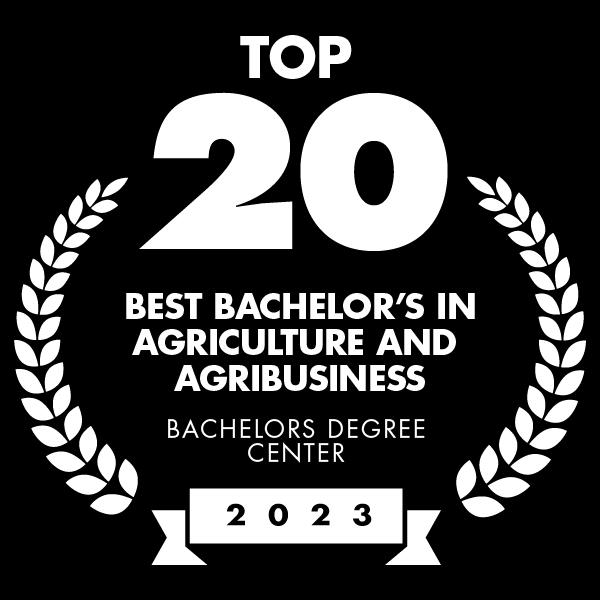The information presented on this page may be dated. It may refer to situations which have changed or people who are no longer affiliated with the university. It is archived as part of Mississippi State University's history.
A Legacy of Service
Author: Vanessa Beeson

Dr. Bob Williams stands in the connector that joins the Animal and Dairy Sciences and Poultry Science buildings. (Photo by David Ammon)
Dr. Bob Williams has spent the better part of the last sixty years on the MSU campus in Starkville. When he arrived as a transfer student in 1959, Howell was the northern-most building on campus aside from a red livestock barn that stood where the Humphrey Coliseum is today. As he retired in the summer of 2020 after 56 years of service, his most recent role has involved shaping MSU's campus for the future.
Contributing to the MSU campus of tomorrow is all in a day's work for a numbers guy who grew up working on a cotton farm near Alligator, Mississippi.
"Alligator is in Bolivar County, heading north on Highway 61 from Cleveland to Memphis. You won't go through it. You'll go by it," said Williams, who always had his sights on an agricultural career.
Williams has experienced considerable change both on campus and in agriculture.
"When I came here, there were maybe 4,800 students total," he remembered, pointing out that last year's enrollment alone topped 22,000.
He talked about advancements in agriculture as well.
"Changes in equipment and farming practices have been tremendous. In high school, I drove a high boy that sprayed insecticides in cotton four rows at a time, now a high boy sprayer might spray 16 or 24 rows," he said. "Similarly, I remember in the 1980s, we thought 25 bushels of soybeans per acre was a good crop. Now, 50 bushels per acre is considered a decent yield," he said.
Throughout the years, he's kept his finger on the pulse of agriculture, serving more than 32 years as an agricultural economist with the MSU Extension Service, retiring in 1995. His second act came that same year when he returned as a part-time project coordinator working for Dr. Rodney Foil, who was vice president of the Division of Agriculture, Forestry, and Veterinary Medicine at the time.
"My first project for Dr. Foil was helping coordinate a retirement reception for Jim Buck Ross, a CALS alumnus who served for 28 years as Mississippi's ag commissioner," said Williams, who noted that the event garnered around $100,000 in scholarship funds.
Williams went on to organize other events and special projects throughout the years. Most recently, one of his favorite aspects of the position has been helping assist on several construction projects for the division, having a hand in how future students will experience the campus where he's spent so much of his life.
Over the last five years, Williams has assisted on the planning and construction process for both the new poultry science and animal and dairy sciences buildings. He has been involved in initial discussions to obtain funding approval through the Bureau of Building, Grounds and Real Property Management and the Mississippi Institutions of Higher Learning through to facility openings and serving as liaison for DAFVM administration in the process.
"I attended meetings on behalf of the vice president and helped communicate the division's needs and vision for a particular building. MAFES Engineer, David Howell, is the key person in this entire process and he tends to keep us all on track," he said.
As for his earlier career with the MSU Extension Service, Williams was hired as an Extension economist and retired as state program leader for agriculture and natural resources. During those years, he collaborated on a large multistate project with the Tennessee Valley Authority that spanned decades, leading him to receive a distinguished service award from the Tennessee Valley Farm Family Association. He authored several publications on the economics of production and marketing of various row-crop commodities. In 1980, Williams served on Mississippi Governor William Winter's economic task force and in 1982, he testified before the U.S. House of Representatives Agricultural Subcommittee on behalf of the MSU Extension Service. He spent five years in leadership in the Mississippi Association of County Agricultural Agents, serving as president and has been honored by the MSU Alumni Association.
"During my time with Extension, I got to know all the agricultural agents in the state and was invited to speak all over the area including the Memphis Ag Club, which for someone who grew up in Alligator was a pretty big honor since they represented the pinnacle of mid-south agriculture for me," he said.
Williams began his collegiate journey at Sunflower Junior College, now Mississippi Delta Community College, and transferred to MSU after two years. From there, he worked toward his bachelor's, which was not without its challenges. He said he even considered leaving MSU at one time, but a professor helped him see it through.
"I struggled my first semester at Mississippi State and considered leaving to join the army, but Professor Felix Edwards in the ag engineering department pulled me aside and said, 'Don't leave. I'll try to get you a job and we'll do our best to get you through the next three semesters.' I followed his advice and stayed, and I give him a lot of credit for helping me finish," Williams said.
After the momentum of earning a bachelor's degree was behind him, a master's degree seemed possible. The Department of Agricultural Economics had graduate assistantships, so Williams applied. He was accepted into the program and, with Dr. Verner Hurt's help, graduated in May of 1963. When he was hired fulltime by the MSU Extension Service, Williams slowly worked toward earning his doctoral degree, which he received in 1977. He also served six months active duty in the Army National Guard and left as a captain after 13 years of service. Williams said his favorite aspect of his career has been the people he's met along the way.
"We have some good folks in the ag division and at Mississippi State and the people aspect is really neat. I will miss that," he said.
His proudest accomplishment, perhaps, has been the people he's helped—MSU students—through his work to establish six scholarships. One scholarship, the Robert L. Williams Endowed Scholarship in the College of Agriculture and Life Sciences, was established in 2007 and bears his name.
"That was both a tremendous honor and a big surprise," Williams remembered.
Williams said he and his wife, Nancy, have been blessed so they're happy to pay it forward to current MSU students who could use a helping hand. One chance encounter with a member of the Bulldog family sticks out in particular to Williams as motivation to make giving a priority.
He recalled being in line behind a young student in Perry Cafeteria one day many years ago.
"This was back when Perry Cafeteria was the main place on campus to eat. The young man put turnip greens, black-eyed peas, a piece of cornbread and a glass of water on his tray. It seemed like that youngster was sacrificing something to stay in college. That may have been his favorite meal, but I bet he would've liked a little meat, maybe dessert, or a drink. That left a lasting impression on me to help students who have that kind of dedication to get a degree at Mississippi State," he said.
In 2019, an endowment was established by former vice president for agriculture, forestry, and veterinary medicine, Dr. Gregory A. Bohach, naming the Dr. Robert L. Williams DAFVM Stellar Staff Awards in his honor.
Dr. Reuben Moore, interim director of the Mississippi Agricultural and Forestry Experiment Station, said Williams has contributed a lasting legacy of service to the division and Mississippi agriculture.
"Dr. Williams has been a valued part of the DAFVM administration. Throughout the years, he took on many difficult assignments and never complained," Moore said. "While much of his work was behind the scenes, I sought his advice often because of his experience and devotion to MSU. His calm demeanor and wise counsel will be missed."
Date: 2021-06-10




